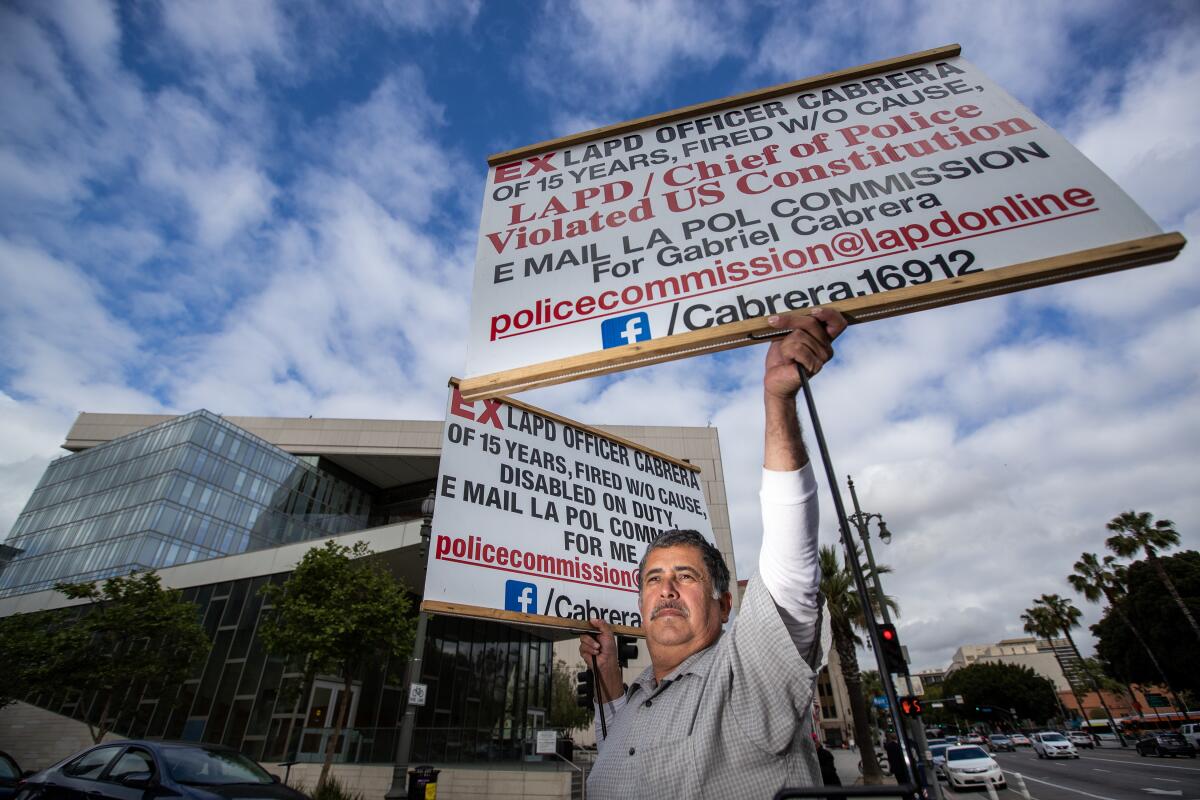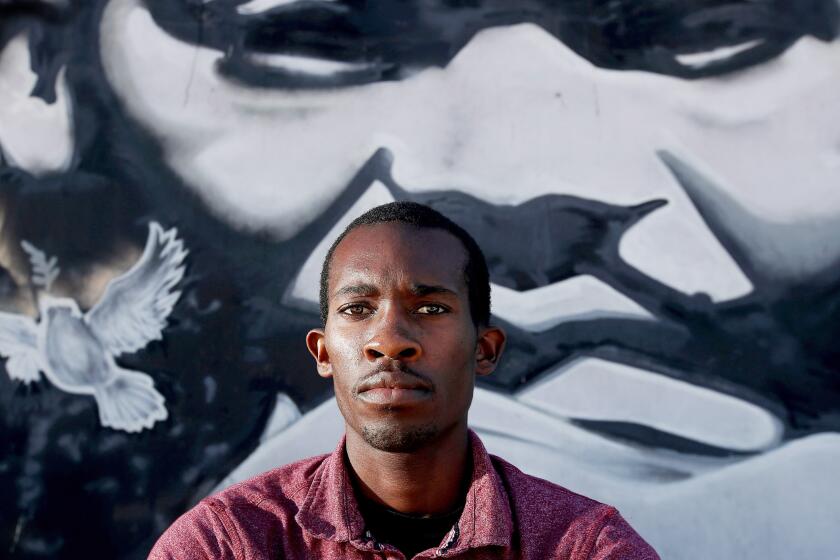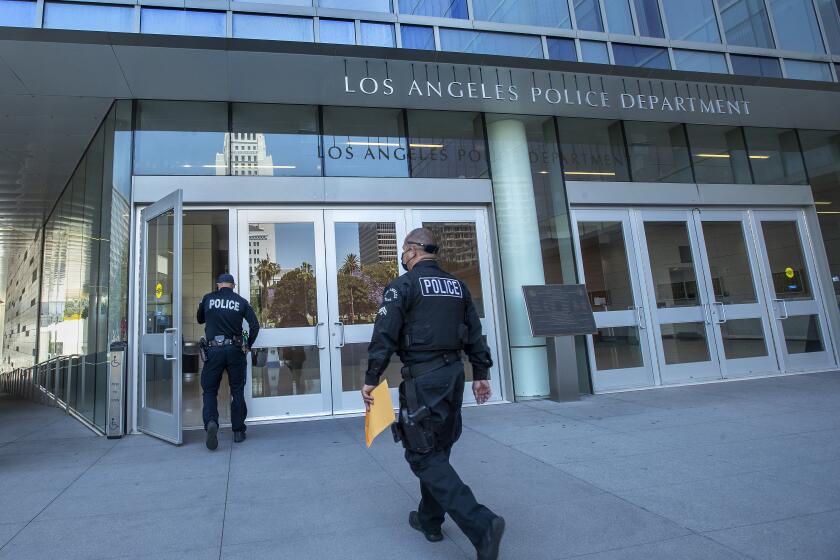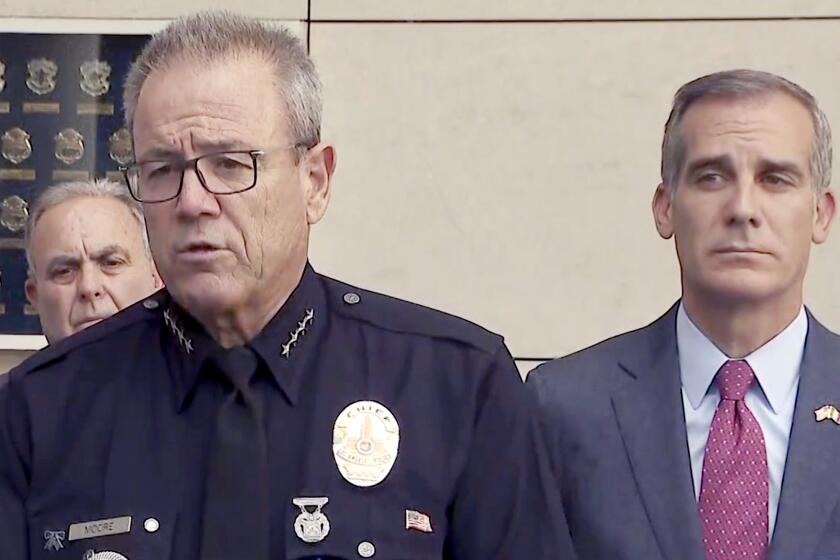The fired officer manning a lonely picket line outside LAPD HQ

- Share via
Nothing much fazes Gabriel Cabrera after 17 months of picketing outside Los Angeles Police Department headquarters.
There was the time, he said, a bicyclist spat on him. And the glares he encounters from officers on their way to and from work. Plus the occasional “F— 12” taunts hurled from passing cars, “12” being slang for police. He said he mostly tunes them out and tells himself, well, at least people are paying attention.
It’s been more than a decade since the former LAPD officer was fired for what department officials said was involvement in an improper real estate deal. Cabrera has denied any wrongdoing, and hopes his protest will help get his job back while drawing attention to what he says was the real reason for his termination: the department’s unspoken policy of forcing out officers who have been injured at work.
And so on most Tuesday mornings — his day off from his current job working security at Disneyland — he drives downtown to carry out his protest. Sometimes his wife, Maria, tags along. She usually stands nearby, flipping through her phone in the shade of a large auditorium that abuts the LAPD’s glass-and-limestone headquarters.
For months, Cabrera has been a fixture along downtown‘s Main Street. It has made him an easy target for passersby. At times he has been cursed out for being pro-police by people he suspects didn’t bother to read his two homemade signs about exposing LAPD “malfeasance.”
On a certain level, Cabrera said, he understands why some might vent their anger from a “bad experience with a police officer” at someone like him — even though he is calling out what he sees as wrongdoing by department leaders.
At 59, he said, he’s too old to understand social media but has been told by friends that if he pickets long enough, someone might post his picture online and make it go viral. He’s also taken to emailing members of the Board of Police Commissioners on a weekly basis, copying Mayor Karen Bass, LAPD Chief Michel Moore and anyone else he thinks will listen.
He read a story in The Times about how the commission, the civilian-led body that oversees the department, voted a few years ago to posthumously reinstate one of the LAPD’s first Black officers. Commissioners made the symbolic decision because the officer, Robert William Stewart, had been forced out of the department in 1900 based on false allegations.
Maybe they could do the same for him, Cabrera tells himself.
One Tuesday in April, he finally took a day off from protesting to attend a commission meeting and plead his case in person. When it came his turn to speak, the five commissioners listened passively until his allotted time was up. He went back to his seat and the next public speaker was called.
Cabrera said that he understands the likely futility of asking for his job back after so many years but that he has to keep trying to undo a wrong — a dogged determination instilled in him by his father, who flew 35 missions over Germany as a radioman on a B-17 in World War II.
According to Cabrera, his troubles started in 1998.
For the record:
12:31 p.m. Oct. 19, 2023An earlier version of this article reported that Gabriel Cabrera joined the Los Angeles Police Department after a stint in the Marines. Cabrera served in the Army.
The East L.A. native had joined the LAPD about a year before, after a stint in the Army. He and his partner were on patrol in the West L.A. Division when they responded to a report of an intoxicated man at Santa Monica Boulevard and Armacost Avenue. Cabrera said they took the man into custody without incident but were in close contact with him during the arrest.
A few weeks later, he said, he began suffering headaches and came down with a high fever. He also started forgetting things. A doctor, he said, diagnosed him with meningitis, an inflammation of tissues around the brain and spinal cord that can leave patients with mild cognitive impairment.
Convinced that he contracted the infection, typically spread by respiratory droplets, during his arrest of the intoxicated man, Cabrera filed a workers’ compensation claim and was off work for several months on medical leave.
Once he came back, he said, he felt like a marked man.
Bernard Robins, who was detained outside his parents’ South L.A. home by fellow LAPD officers, said the episode typifies the style of biased policing that’s practiced in some parts of the city.
The LAPD defends itself in scores of lawsuits and claims brought every year by officers alleging they were discriminated against after being injured on the job. But history shows the department has reason to be suspicious.
For years, the LAPD did not closely track employees on extended injury leave, opening the door for abuse. Officers would file claims and continue collecting their salaries, sometimes for years, without working. A Times investigation in 2014 found a dramatic rise in the rate of injury claims filed by police and firefighters, which were costing the city tens of millions of dollars annually. A city audit later found a culture of filing excessive claims.
The LAPD began to crack down around 2017, launching inquiries and creating a unit within the Special Operations Division tasked with investigating worker’s comp fraud. One investigator testified at a recent deposition that the unit’s officers have been known to tail cops suspected of faking an injury to the gym and while they dropped their children off at school.
Upon his return to work, Cabrera was placed on permanent light duty that forced him to staff the station’s front desk. His supervisors began to watch him closely, second-guessing his every move, he said. Every so often, the department would approach with an offer to retire with a medical pension between 10% and 20% of his base pay. Each time, he declined, convinced it wasn’t enough to support his family.
Lucy Garcia remembers Cabrera from those days. The two met when she came to the station one time to report alleged abuse at the hands of her former partner. He was also working the front desk when she came in seeking help for her ailing father, who she suspected was being mistreated by his caretaker. Cabrera showed her compassion and insisted on stopping by her father’s house to conduct a welfare check, she said.
“He followed up and would come around,” Garcia recalled, saying the two of them have stayed in touch.
In 2008, Cabrera found himself under internal investigation after a cousin accused him of elder abuse and of failing to pay back money he owed her for a real estate deal that fell through.
Department investigators accused Cabrera of failing to abide by the terms of a court order to pay his cousin $150,000 and depositing the proceeds of an $80,000 loan against her property into his own bank account. The internal complaint against him also said he had lied to investigators.
According to Cabrera, the cousin was facing foreclosure and had used him as a “straw buyer” in an elaborate scheme to help her refinance her home. He denied committing fraud and blamed any false statements he made to internal affairs detectives on his “cognitive and memory issues” brought on by the meningitis.
Facing termination, he was sent before a Board of Rights, a mini-trial in which the officer and department officials present evidence and call witnesses.
Los Angeles police have created an internal task force to investigate alleged misconduct by a San Fernando Valley gang unit.
But before the hearing, Cabrera alleges, his attorney told him that the outcome had already been decided and that the department was using the internal affairs case as a cover for firing him because of his disability, and that if department higher-ups wanted him gone, the discipline system was set up in a way that leaned in their favor. The attorney, Larry Hanna, declined to comment.
The board found Cabrera guilty of eight allegations. He was later fired by then-Chief Charlie Beck.
After his termination in 2012, the Los Angeles Police Protective League denied his request for help filing an appeal. He eventually hired his own lawyer and sued the city, contending that the LAPD’s discipline system was “used, manipulated and exploited … unfairly and unequally, against some fellow and former Police Officers.”
The lawsuit was thrown out of court.
The experience nearly ruined him financially, he said. He had lost not only his $80,000 LAPD salary but also his disability pension benefits. With the couple’s bills mounting, they began renting out the second floor of their Pico Rivera home and living out of their cluttered living room, sharing a bathroom with their tenants. They sold Maria’s wedding ring.
For all the talk of the unbreakable “blue wall” bond shared by officers who wear the uniform, Cabrera said, life after the LAPD can be an isolating experience. Most of his onetime friends and colleagues on the force have stopped responding to his frequent messages. One Tuesday, he said, he made eye contact with a cop he’d been friendly with at the West L.A. station because their lockers had been near each other. “And he just walked right past me without saying anything,” Cabrera said.
His wife, he said, doesn’t like him going downtown to picket and face harassment. She questions whether it will make a difference in getting his job back.
Still, she continued to accompany him on some Tuesdays, sometimes packing a lunch of ham sandwiches and fruit.
Cabrera has had his own doubts. But then he finds himself filled with anger when he thinks about the circumstances under which he was fired and “how they … stabbed me in the back.”
Being outside during the unusually wet winter was miserable, he said, but he would take being drenched over standing out in the sweltering heat as he did a few times last summer. He remembers one Tuesday when the temperature became so high it seemed his shoes started to melt on the asphalt. A couple of hours into the protest, two officers rolled around in a black-and-white squad car and offered him a bottle of water. He chugged it on the spot. But years of battling the department had made him paranoid, and he wondered whether the officers were being friendly or had some other motive.
“I don’t think it’s good publicity if I drop dead picketing in front of police headquarters, and I have two signs [critical of] the police,” he said.
In a recent court filing, former LAPD Cmdr. Nicole Mehringer contested her firing, arguing the department has overlooked — or even helped cover up — similar behavior by dozens of male supervisors.
Last September, Maria suffered a heart attack and underwent triple bypass surgery. He missed a few days of protesting for the first time to be by her side as she recovered, and he thinks the stress of the ordeal is partly to blame for her health problems.
Patrick Smith, another former LAPD cop who knows Cabrera from his West L.A. days, said he too lost friends on the job after he challenged what he saw as discrimination for an on-the-job injury.
“They’re so scared of the machine, the department and what they can do to you, that they won’t even talk to you,” Smith said. “They’re afraid to even be associated or to be seen talking to you.”
After his lawsuit was thrown out, Cabrera said, he began trying to call in favors. He reached out to Lt. Craig Lally, a police union leader who had testified on his behalf during his disciplinary hearing.
Lally stopped returning his phone calls, he said. But he kept trying to reach him, as well as other league members, begging for help.
Eventually, he said, he got an email from Robert Rico, the league’s general counsel.
“I will not mince words,” the July 2022 email began. “Quite simply, and in layman’s terms, you do not have a case.”
Rico said neither the Police Protective league nor Lally had failed Cabrera. Furthermore, Rico wrote, Lally had helped reform the LAPD’s disciplinary system that Cabrera called “corrupt” through a charter amendment that allowed officers to have their cases heard by all-civilian panels.
“And they are now overwhelmingly prevailing on their matters,” Rico wrote. The amendment’s passing “caused much consternation within groups that are not friendly to the police including the ACLU, BLM and the LA Times (Google it).”
Cabrera hasn’t written Rico back.
Nor, he said, does he plan to end his protest anytime soon.
More to Read
Sign up for Essential California
The most important California stories and recommendations in your inbox every morning.
You may occasionally receive promotional content from the Los Angeles Times.














